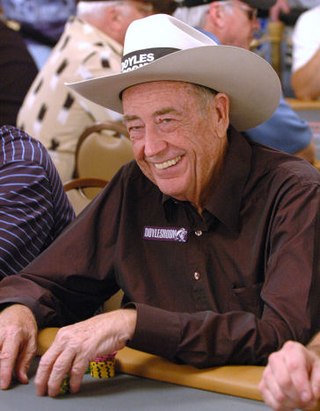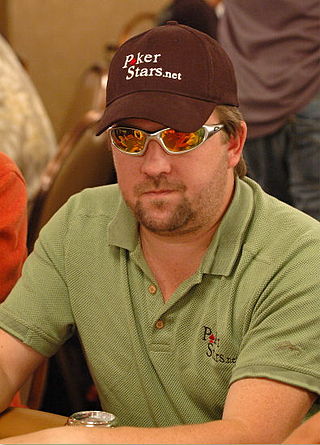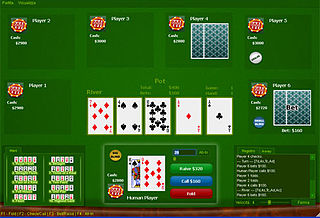The poker boom was a period between 2003 and 2006, [1] during which poker, primarily no-limit Texas hold 'em, but also other variations, became considerably more popular around the world. During the boom years, the online poker player pool at least doubled in size every year. [1]
The seeds of the boom began in 1998, with the release of the film Rounders [2] [3] and the introduction of online poker at Planet Poker. [4] These events built on the occasional telecasts of the World Series of Poker (WSOP) Main Events that were recorded each summer and broadcast later in the year.
Two specific 2003 triggers completed the launch of the poker boom. In the spring of 2003, the World Poker Tour's inaugural season debuted on the Travel Channel on American cable television. The impact of the boom was escalated in May 2003, when amateur Chris Moneymaker won the 2003 WSOP Main Event. [5] Moneymaker won his seat via a $86 satellite tournament on the PokerStars online poker room. [6] Moneymaker was one of 839 entrants in the 2003 event, an increase of roughly 200 players from 2002 and more than doubling the 393 competitors that played in 1999. By the next year, the field in the 2004 Main Event more than tripled to 2576 players. By the 2006 Main Event, there were 8773 competitors, some 14 times as many as had entered the last 2002 pre-boom Main Event. [7]
It is also believed[ who? ] that the NHL lockout of 2004-05, and the subsequent filling of ESPN air time with poker programming influenced the poker boom.[ citation needed ] Another view holds that the poker boom was a classic speculative bubble. [8]
The end of the boom is generally considered to be October 2006, when the Unlawful Internet Gambling Enforcement Act of 2006 (UIGEA) became law in the United States, and several online poker sites, including the industry leader at the time, Party Poker, left the United States. [9] In the first WSOP following the passage of UIGEA, attendance in the WSOP Main Event dropped nearly 28%, from 8773 in 2006 to 6358 at the 2007 Main Event.
The game today remains much more popular than the pre-boom period, with WSOP Main Event attendance having stabilized near the 2007 level, in part due to higher growth levels internationally. [10] [11] [12]
Based on the 6685 entries to the July 2011 launch of the 2011 Main Event, it appears that the "Black Friday" indictments, on April 15, 2011, have not reduced the recent level of poker activity.[ improper synthesis? ] Three of the biggest online poker sites serving players in the United States had their web domains seized and shut down by U.S. Attorney's Office for the Southern District of New York, which alleged they were in violation of federal bank fraud and money laundering laws. [13] Nevertheless, two of them continue to serve the international player pool, and numerous smaller sites continue to allow U.S. players.

The World Series of Poker (WSOP) is a series of poker tournaments held annually in Paradise, Nevada and, since 2004, sponsored by Caesars Entertainment. It dates its origins to 1970, when Benny Binion invited seven of the best-known poker players to the Horseshoe Casino for a single tournament, with a set start and stop time, and a winner determined by a secret ballot of the seven players.

Doyle Frank Brunson was an American poker player who played professionally for over 50 years. He was a two-time World Series of Poker (WSOP) Main Event champion, a Poker Hall of Fame inductee, and the author of several books on poker.

Christopher Bryan Moneymaker, is an American poker player who won the Main Event at the 2003 World Series of Poker (WSOP). His 2003 win is said to have revolutionized poker because he was the first person to become a world champion after qualifying at an online poker site. This has been referred to in the press as the "Moneymaker effect".

Online poker is the game of poker played over the Internet. It has been partly responsible for a huge increase in the number of poker players worldwide. Christiansen Capital Advisors stated online poker revenues grew from $82.7 million in 2001 to $2.4 billion in 2005, while a survey carried out by DrKW and Global Betting and Gaming Consultants asserted online poker revenues in 2004 were at $1.4 billion. In a testimony before the United States Senate regarding Internet Gaming, Grant Eve, a Certified Public Accountant representing the US Accounting Firm Joseph Eve, Certified Public Accountants, estimated that one in every four dollars gambled is gambled online.

Gregory Raymer, nicknamed "Fossilman," is a professional poker player and author. He is best known for winning the 2004 World Series of Poker Main Event.

Juan Carlos Mortensen is an Ecuadorian professional poker player of Danish descent and the first South American Main Event winner of the World Series of Poker. Mortensen is known for his loose play, bluffing tactics, and interesting chip-stacking style.

Ihsan "Sam" Farha is a Lebanese professional poker player. He is best known for finishing as runner up in the World Series of Poker (WSOP) Main Event in 2003. He has won three bracelets at the WSOP in his career.

The 2006 World Series of Poker (WSOP) began on June 25, 2006, with satellite events, with regular play commencing on June 26 with the annual Casino Employee event and the Tournament of Champions held on June 28 and 29. Forty more events, in various disciplines including Omaha, seven-card stud and razz, plus ladies' and senior tournaments, led up to the 10,000 US$ no-limit Texas hold 'em main event starting July 28 and running through the final table on August 10.

PokerStars is an online poker cardroom. It is the largest real money online poker site in the world, controlling over two-thirds of the total online poker market, and can be accessed through downloadable poker clients for Windows, macOS, Android and iOS.
The 2002 World Series of Poker (WSOP) was held at Binion's Horseshoe.

Russell Aaron Boyd, commonly known as Dutch Boyd, is an American professional poker player from Culver City, California.
Poker television programs had been extremely popular, especially in North America and Europe, following the poker boom. This has especially become the case since the invention of the "pocket cam" in 1997, which allows viewers at home to see each player's hole cards. However, viewership has been declining dramatically in recent years, due to laws that restricted online play in the United States.

Fred Goldberg is a professional poker player from Hollywood, Florida.
The Moneymaker effect is the name of the sudden growth in interest in poker after the 2003 World Series of Poker Main Event.
The November Nine was the name used to refer to the final nine contestants, or final table, at the Main Event of the World Series of Poker (WSOP) from 2008 to 2016. The winner of the WSOP Main Event is considered to be the World Champion of Poker.

United States v. Scheinberg, No. 1:10-cr-00336 (2011), is a United States federal criminal case against the founders of the three largest online poker companies, PokerStars, Full Tilt Poker and Cereus, and a handful of their associates, which alleges that the defendants violated the Unlawful Internet Gambling Enforcement Act (UIGEA) and engaged in bank fraud and money laundering to process transfers to and from their customers. A companion civil case, United States v. PokerStars, et al., 11 Civ. 2564 (2011), included Full Tilt and Cereus as defendants and seeks the recovery of forfeiture equalling approximately $3 billion in assets belonging to the companies. After the indictment was unsealed on April 15, 2011, a date quickly dubbed Black Friday by the online poker community, PokerStars and Full Tilt stopped offering real money play to their United States customers. Three years after the start of the poker boom in 2003, the U.S. Congress passed UIGEA to extend existing gambling laws into cyberspace. The law made processing payments for illegal online gambling a crime; however, the defendant companies remained in the U.S. market in the belief that the law did not cover poker. A former payment processor for the companies turned state's evidence after initially being charged with violating UIGEA himself. On September 20, the civil suit was amended claiming individual fraud by Howard Lederer, Chris Ferguson and Rafael Furst.
The card game of poker was developed in the United States at some point during the early 19th century, drawing its name and basic concept from much earlier European games. Since its early beginnings, poker has grown to become an extremely popular pastime throughout the world.
The 2019 World Series of Poker was the 50th annual tournament, and took place from May 28 – July 16, 2019 at the Rio All-Suite Hotel & Casino in Las Vegas, Nevada.